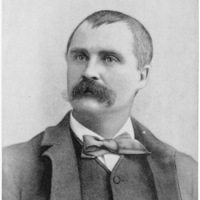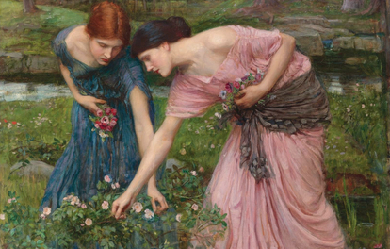The Fisherman of Wexford
THERE is an old tradition sacred held in Wexford town,
That says: 'Upon St. Martin’s Eve no net shall be let down;
No fishermen of Wexford shall, upon that holy day,
Set sail or cast a line within the scope of Wexford Bay.’
The tongue that framed the order, or the time, no one could tell;
And no one ever questioned, but the people kept it well.
And never in man’s memory was fisher known to leave
The little town of Wexford on the good St. Martin’s Eve.
Alas! alas for Wexford! once upon that holy day
Came a wondrous shoal of herring to the waters of the Bay.
The fishers and their families stood out upon the beach,
And all day watched with wistful eyes the wealth they might not reach.
Such shoal was never seen before, and keen regrets went round—
Alas! alas for Wexford! Hark! what is that grating sound?
The boats’ keels on the shingle! Mothers! wives! ye well may grieve,—
The fishermen of Wexford mean to sail on Martin s Eve!
‘Oh, stay ye!’ cried the women wild. ‘Stay!’ cried the men white-haired;
‘And dare ye not to do this thing your fathers never dared.
No man can thrive who tempts the Lord!’ ‘Away!’ they cried: 'the Lord
Ne’er sent a shoal of fish but as a fisherman’s reward.’
And scoffingly they said, ‘To-night our net shall sweep the Bay,
And take the Saint who guards it, should he come across our way!’
The keels have touched the water, and the crews are in each boat;
And on St. Martin’s Eve the Wexford fishers are afloat!
The moon is shining coldly on the sea and on the land,
On dark faces in the fishing-fleet and pale ones on the strand,
As seaward go the daring boats, and heavenward the cries
Of kneeling wives and mothers with uplifted hands and eyes.
‘ Oh Holy Virgin! be their guard! ’ the weeping women cried;
The old men, sad and silent, watched the boats cleave through the tide,
As past the farthest headland, past the lighthouse, in a line
The fishing-fleet went seaward through the phosphor-lighted brine.
Oh, pray, ye wives and mothers! All your prayers they sorely need
To save them from the wrath they’ve roused by their rebellious greed.
Oh! white-haired men and little babes, and weeping sweethearts, pray
To God to spare the fishermen to-night in Wexford Bay!
The boats have reached good offing, and, as out the nets are thrown,
The hearts ashore are chilled to hear the soughing sea-wind’s moan:
Like to a human heart that loved, and hoped for some return,
To find at last but hatred, so the sea-wind seemed to mourn.
But ah! the Wexford fishermen! their nets did scarcely sink
One inch below the foam, when, lo! the daring boatmen shrink
With sudden awe and whitened lips and glaring eyes agape,
For breast-high, threatening, from the sea uprose a Human Shape!
Beyond them,—in the moonlight,—hand upraised and awful mien,
Waving back and pointing landward, breast-high in the sea ’twas seen.
Thrice it waved and thrice it pointed,—then, with clenched hand upraised,
The awful shape went down before the fishers as they gazed!
Gleaming whitely through the water, fathoms deep they saw its frown,—
They saw its white hand clenched above it,—sinking slowly down!
And then there was a rushing ' neath the boats, and every soul
Was thrilled with greed: they knew it was the seaward-going shoal!
Defying the dread warning, every face was sternly set,
And wildly did they ply the oar, and wildly haul the net.
But two boats’ crews obeyed the sign,—God-fearing men were they,—
They cut their lines and left their nets, and homeward sped away;
But darkly rising sternward did God’s wrath in tempest sweep,
And they, of all the fishermen, that night escaped the deep.
Oh, wives and mothers, sweethearts, sires! well might ye mourn next day;
For seventy fishers’ corpses strewed the shores of Wexford Bay!


